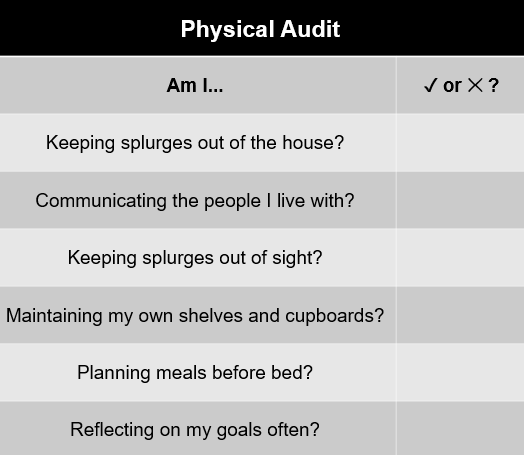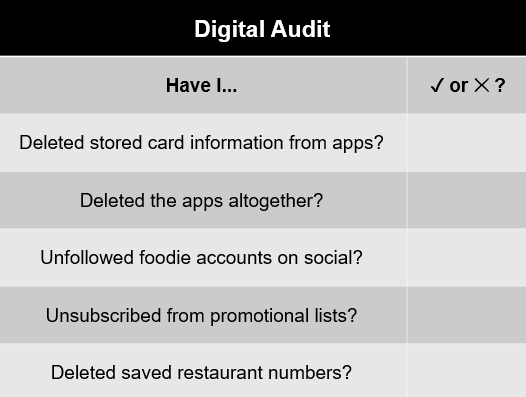When it comes to eating well, I can’t stress enough how poorly your time is spent looking for ways to stay “disciplined.”
It’s a battle you won’t win.
With few exceptions, the healthiest eaters you know aren’t healthy eaters because they’re more “disciplined” than you. They eat well because they don’t put themselves in positions to have their discipline tested.
In other words, their physical, digital, and social environments are conducive to success.
Take my dad, for example. At almost sixty year old, his diet allows him to have visible abs, run half marathons with my siblings, and do powerlifting and strongman workouts with me:
His friends and co-workers call him a “health nut,” claiming they lack the discipline to eat how he eats.
But he (A) doesn’t keep junk in his apartment. If he did, he’d (self-admittedly) splurge on it. He (B) doesn’t surround himself with people whose only social activities include eating and drinking. And he (C) doesn’t keep pizza places on speed dial.
In short, he doesn’t put himself in positions to be tested often. And when you learn how to audit your environment, as he has, you won’t waste time looking for discipline, because you won’t put yourself in positions to need it.
Ready for your Environmental Audit?
Audit #1: Physical
Your physical environment is, by far, the number one factor dictating success. The likelihood of you doing well when surrounded by temptations on a regular basis, is very, very low. This is because decision-making comes down to friction:
The more friction between you and a good decision, the less likely you are to make it. The less decisions between you and a poor decision, the more likely you are to make it.
To get specific: pretend you had a long, tiring day at work. You come home to a half-eaten box of pizza your family ordered beforehand (low friction). There’s also frozen, unprepped chicken in the freezer (high friction). The most “disciplined” people I know wouldn’t pass on the pizza—including my dad.
So there’s the obvious recommendation of only keeping healthy food at home—and if you live alone, this is simple—especially with the Approved Foods List I’m giving away:
But many of us live with spouses, roommates, and kids who don’t share our goals. So it’s not realistic to get rid of all the temptations around us. If this is your reality, I recommend:
✓ Having proactive conversations with the people you live with. Tell them about your goals and ask for support (in the form of ordering fewer splurges, reminding you of your goals, and not pressuring you to participate in splurges).*
*If they pressure you anyway, use THIS step-by-step script to fight back.
✓ Keeping splurges out of sight. After all, “out of sight, out of mind.” You’re less likely to crave something you forget is in the house.
✓ Having separate cupboards and shelves for yourself. Distinguish between “your food” and “everybody else’s food.” This subtle difference offers more friction between you and poor choices.
✓ Planning your meals before bed. If you wake up with a plan, instead of winging it (as most people do), you’re less likely to stray. In some cases, actually prepping your food makes more sense. Done once or twice per week, in conjunction with planning, you’ll have less friction between you and good choices.
✓ Reflecting on your goals often. Yes, splurges taste good in the moment. But is it worth the ramifications for “future you”? Feeling bloated an hour later? Heavier the next morning? Disappointed a week later?

Pulling up MyFitnessPal and planning the next day’s nutrition before bed is a no-brainer
Audit #2: Social
Don’t worry: I’m not going to tell you you can’t see your friends and family if they like to splurge. But I am going to challenge you to assess:
- How often you see them
- The settings you see them
- What happens in these settings
- Whether they’re open to alternate activities
Again, specifics are helpful:
When I was living in New York, I had a friend groups who only ever wanted to “get apps” or catch up over drinks. Naturally, there’s nothing wrong with this, but I had to question whether spending so much time with them made sense for my health, business, and productivity.
Unfortunately, the answer was no.
This is where I had to socialize with them a bit less, or see if they were open to other activities—and you’d be shocked how many people were on board. Whether it was hiking (upstate), walking, doing board games, connecting for coffee, working out, or beginning a book club: other people WERE craving variety.
But few people have the courage to suggest alternatives in a group chat. YOU can be the exception.

Not everyone wants to do drinks (even virtually) every time
Audit #3: Digital
When living in Miami, my apartment was minutes away from Insomnia Cookies (a chain offering cookie deliveries all hours of the night). Admittedly, I took advantage of this (many times), and ended up on their email list. This led to me following them on social media, and downloading their app, too.
When I began a diet a few months later, I had a very hard time staying away from their cookies. But it wouldn’t make sense that I wouldn’t. After all, what kind of decisions is somebody going to make when they:
- Get emailed offers daily
- See delicious-looking photos
- Have points for free cookies
Speaking from experience: not good ones. So I unsubscribed from their list, unfollowed their accounts, and deleted the app. That way, if I wanted Insomnia Cookies, it’d be a pain to order (the aforementioned friction).

How often can someone reasonably turn these down?
A full digital detox includes:
- Deleting card information from apps
- Deleting food ordering apps altogether
- Unfollowing all “food porn” accounts
- Unsubscribing from promotional lists
- Deleting take-out phone numbers*
*And menus with this information.
By now, you know better than to look for ways to “stay disciplined.” Instead, use these Environmental Audits to see if you’re putting yourself in a position to succeed (starting with Physical):

Next, up, Social:

Finally, your Digital Audit:

If this isn’t enough, and you want a second pair of eyes on your decisions, along with a personalized nutrition plan: I may be able to help:





